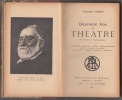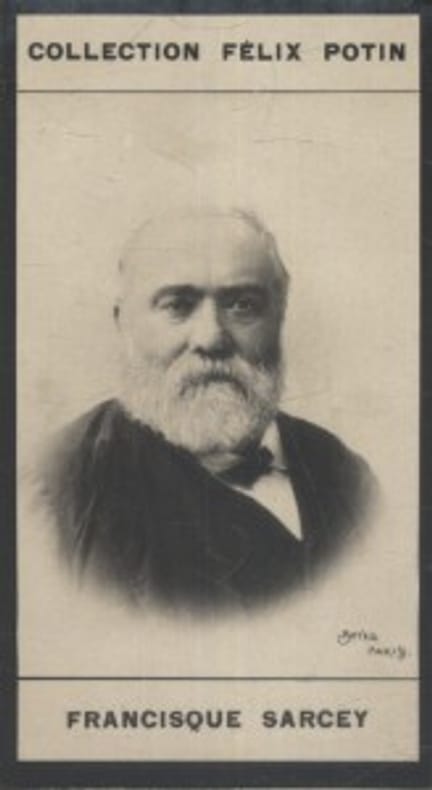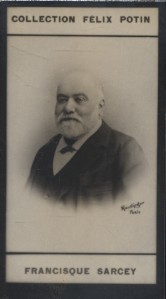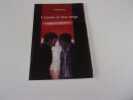-
Latest
Last 24h (17)
Last 3 days (15)
Last month (239)
Last week (73)
-
Language
Dutch (2)
English (22)
French (40801)
German (9)
Italian (14)
Latin (3)
Polish (1)
Portuguese (3)
Russian (1)
Spanish (2)
-
Century
15th (1)
16th (9)
17th (47)
18th (663)
19th (5541)
20th (19216)
21st (1130)
-
Countries
Belgium (1531)
Brazil (1)
Canada (158)
China (1)
Côte d'Ivoire (89)
Denmark (69)
France (36334)
Greece (1)
Italy (248)
Netherlands (2)
Switzerland (2424)
-
Syndicate
ALAC (151)
CLAM (20)
CLAQ (119)
CNE (20)
ILAB (21925)
NVVA (314)
SLACES (314)
SLAM (21051)
SNCAO (268)
MANQUE. L'AMOUR DE PHEDRE.
L'ARCHE / SCENE OUVERTE. 1999. In-12. Broché. Etat d'usage, Couv. légèrement pliée, Dos satisfaisant, Intérieur frais. 119 pages.. . . . Classification Dewey : 792-Théâtre
raduit de l'anglais par Evelyne Pieiller. Classification Dewey : 792-Théâtre
ANGELO MUSCO IL GESTO LA MIMICA L'ARTE
PALERMO NOVECENTO EDITRICE 1987
Edizione del 1787 di questo volume sull'attore di cinema e teatro Angelo Musco (1871-1937) Saggio di Sarah Muscarà ed Enzo Zappulla. Introduzione di Gregorio Napoli. Prefazione di Gian Luigi Rondi. Numerose foto d'epoca all'interno. Alla fine ampia cronologia dei film e opere teatrali. In ottime condizioni. Copertina in tela editoriale con sovraccoperta in ottime condizioni generali con lievi usure ai margini e dorso. Legatura in buone condizioni. Pagine in ottime condizioni. In 4. Dim. 35x25,5 cm. Pp. XIV+(2)+462. Kg. 2,200 Edition of 1787 of this volume about the actor of theatre and cinema Angelo Musco (1871-1937) Essay by Sarah Muscarà and Enzo Zappulla. Introduction by Gregorio Napoli. Prefation by Gian Luigi Rondi. Different photoes inside. At the end wide cronology of movies and theatre works. In very good conditions. Cloth editorial cover with dustjacket in very good general conditions lightly worn in the extremities. Binding in good conditions. Inside pages are in very good conditions. In 8. Dim. 20x14 cm. Pp. XIV+(2)+462. Kg. 2,200
Quarante ans de theatre (Feuilletons dramatiques).
1901 Bibliothéque des annales-1901-in-12 ,1/2 toile -439 pages
bon état Remise de 20% pour toutes commandes supérieures à 200 €
Paris Vivant – Le Théâtre.
Illustré de 31 compositions dessinées par Gérardin, Lepère, Mouligné, Tinayre, Bellanger, Dété et Paillard, dont 3 hors-texte en eaux-fortes. Paris, Société Artistique du Livre Illustré, 1893. In-8 (23,5x15,5cm) relié demi chagrin noir, dos lisse orné de fers dorés, nom de l'auteur et titre dorés, couverture marron imprimé conservé, tête rouge, petites éraflures sur sur la reliure. 63pp.
Édition originale de cette publication qui a été imprimé à 530 exemplaires, celui-ci, n°435/500 sur papier du Marais. Quelques traces de mouillures et deux volumes seuls publiés de la série «Paris Vivant».
Comédiens et comédiennes. Deuxième série : Théâtre divers.
Paris Librairie des bibliophiles 1884 un fort volume in-8° (16 x 26cm), 20 19 24 24 28 24 24 28 31 23 23 24 24 24 24 23 pp. Reliure en demi-chagrin noir à coins, dos à nerfs, fleurons et titre dorés, filet doré sur les plats, tête dorée, couverture en bistre conservée. (reliure un peu frottée, des feuillets faiblement brunis). Illlustré de 16 eaux-fortes de Gaucherel et Lalauze sous serpente.
Comédiens et Comédiennes. La Comédie Française. Notices par F. Sarcey. Portraits d'artistes gravés à l’ eau-forte par Léon GAUCHEREL. Complet des 2 séries de 16 livraisons chaque.
Jouaust Librairie Des Bibliophiles Paris 1876 32 livraisons reliées en 2 volumes in-8 ( 255 X 170 mm ), demi-basane fauve, dos à nerfs jansénistes avec pièces de titre de maroquin vieux rouge et dates dorées en queues. portraits gravés à l'eau-forte hors-texte par Léon GAUCHEREL, tirés soit sur un beau papier vergé ivoire, soit sur Chine. Agréable exemplaire, complet des 2 séries de 16 livraisons chaque ce qui est rare.
Paris vivant. Le Théâtre
Paris, Société artistique du livre illustré, 1893. Un volume (23 cm x 15,5 cm), 62 pp. Nombreux dessins et gravures in-texte. Un des 300 exemplaires numérotés sur papier du Marais. Broché.
QUARANTE ANS DE THEATRE (FEUILLETONS DRAMATIQUES), TOME IV
Bibliothèque des Annales Politiques et Littéraires. 1901. In-12. Relié demi-cuir. Etat d'usage, 1er plat abîmé, Dos frotté, Papier jauni. 439 pages. Portrait en noir et blanc en frontispice. Titre et tomaison dorés sur le dos. Manques en surface du 1er plat.. . . . Classification Dewey : 792-Théâtre
Victor Hugo. Dumas Père. Scribe. Casimir Delavigne. Balzac. G. Sand. E. Legouvé. A. de Musset. Ponsard. D'Ennery. Labiche, etc. Classification Dewey : 792-Théâtre
Quarante ans de Théatre (feuilletons dramatiques).
Bibliothèque des Annales Politiques et Littéraires. 1900-1902. In-12. Relié demi-cuir. Bon état, Couv. convenable, Dos satisfaisant, Papier jauni. 403 + 402 + 439 + 382 + 428 + 430 + 443 pages - plats jaspés - dos à 4 nerfs - auteur, titre et tomaison dorés sur le dos.. . . . Classification Dewey : 792-Théâtre
Classification Dewey : 792-Théâtre
Quarante ans de Théatre (Feuilletons dramatiques).
1900 P., Bibliothèque des Annales Politiques et Littéraires, 1900-02, 4 volumes in 12 reliés demi-basane bleue, dos à nerfs, 402, 428, 382 et 430 pages ; frontispices ; index à la fin de chaque volume ; petits défauts d'usage.
1er Volume : Molière et la Comédie classique. .......... 2nd Volume : Victorien Sardou, Meilhac et Halévy, Edouard Pailleron, Henry Becque. .......... 3e Volume : E. Augier, O. Feuillet, Erckmann-Chatrian, Dumas fils, H. de Bornier, etc. .......... 4e Volume : E. Zola, J. Claretie, F. Coppée, A. Parodi, E. Bergerat, P. Déroulède, J. Aicard, G. Ohnet, A. Bisson, J. Richepin, G. Porto-Riche, O. Mirbeau, J. Lemaitre, F. de Curel, J. Jullien. ...................... Photos sur demande ..........................


Phone number : 04 77 32 63 69
Quarante ans de Théatre (Feuilletons dramatiques). Molière et la Comédie classique.
P., Bibliothèque des Annales Politiques et Littéraires, 1900, in 12 broché, 402 pages; frontispice ; index ; couverture défraichie avec petits manques.
PHOTOS sur DEMANDE. ...................... Photos sur demande ..........................


Phone number : 04 77 32 63 69
Quarante ans de théâtre (Feuilletons dramatiques) E. Augier, O. Feuillet, Erckmann-Chatrian, Dumas fils, H. de Bornier, etc
Bibliothèque des annales. 1901. In-12. Broché. Etat d'usage, Coins frottés, Coiffe en tête abîmée, Papier jauni. 382 pages. Plats jaspés. Etiquette collé en coiffe de pied. Manque en coiffe de tête.. . . . Classification Dewey : 792-Théâtre
Classification Dewey : 792-Théâtre
"Quarante ans de théâtre (feuilletons dramatiques); 8 volumes. "
Paris, Bibliothèque des Annales politiques et littéraires, 1900-1902. "12 x 19, 8 volumes, vii-403 + 402 + 404, 439 + 382 + 428 + 430 + 443 pages, demi-reliure dos cuir à 5 nerfs, ornée de filets dorés, tête dorée, pages de garde papier marbré, bon état (quelques épidermures; dos légèrement frotté, tome 8 : mors fendu sur 2 cm); exemplaire nominatif de Mr. Maxime de Janzé, indiqué ""M. J."" en pied."
"Série complète en 8 volumes; tome 1 : La critique et les lois du théâtre, la comédie française; tome 2 : Molière et la comédie classique; tome 3 : Corneille, Racine, Shakespeare et la tragédie; tome 4 : Victor Hugo, Dumas père, Scribe, Casimir Delavigne, Balzac, G. Sand, E. Legouvé, A. de Musset, Ponsard, d'Ennery, Labiche, etc.; tome 5 : E. Augier, O. Feuillet, Erckmann-Chatrian, Dumas fils, H. de Bornier, etc.; tome 6 : Victorien Sardou, Meilhac et Halévy, Edouard Pailleron, Henry Becque; tome 7 : E. Zola, J. Claretie, F. Coppée, A. Parodi, E. Bergerat, P. Déroulède, J. Aicard, G. Ohnet, A. Bisson, J. Richepin, G. Porto-Riche, O. Mirbeau, J. Lemaître, F. de Corel, J. Jullien; tome 8 : Paul Hervieu, E. Brieux, A. Capus, Henri Lavedan, Maurice, Donnay, G. Courteline, L. Gandillot, G. Feydeau, E. Rostand, Antoine et le Théâtre-Libre, Les auteurs étrangers."
Quarante ans de Théâtre. Molière et la comédie classique.
P., Bibliothèque des Annales politiques et littéraires, 1900, in-12, 404 pp, une gravure représentant l'auteur en pied en frontispice, index, reliure demi-percaline grise époque, pièce de titre de maroquin rouge, qqs annotations crayon sur les 28 premières pages
Photographie de la collection Félix Potin (4 x 7,5 cm) représentant : Francisque Sarcey, homme de lettres et critique dramatique.
- Photographie 4 x 7, 5 cm. Notice biographique collée au dos.
Photo. Né à Dourdan. 1828-1899. Photo Boyer. Félix Potin, Début XXe. Vers 1900.

Photographie de la collection Félix Potin (4 x 7,5 cm) représentant : Francisque Sarcey, homme de lettres et critique dramatique.
- Photographie 4 x 7, 5 cm. Notice biographique collée au dos.
Photo. Né à Dourdan. 1828-1899. Photo Boyer. Félix Potin, Début XXe. Vers 1900.

COMME LE MOT NEIGE
grand format, couverture souple. 90 pages. Bon état. 2006 les impressions nouvelles
MEPHISTOPHELES, PIECE EN UN ACTE EN VERS
L'Ouest. 1932. In-8. Broché. Bon état, Couv. légèrement passée, Dos frotté, Quelques rousseurs. 31 pages. Tampon de numérotation en page de titre: 118. Envoi de l'auteur au dos de la page de titre. Plaquette.. . . . Classification Dewey : 792-Théâtre
'Mon ami René Lacôte Voudra bien trouver dans cette dédicace L'expression de ma sympathie reconnaissante', E.S. Classification Dewey : 792-Théâtre
La famille Benoiton. Comédie en cinq actes en prose. 3e édition.
P., Lévy, 1866, in 12 relié demi basane vert bouteille, 212 pages ; dos à faux nerfs ; petits frottis.
PHOTOS sur DEMANDE. ...................... Photos sur demande ..........................


Phone number : 04 77 32 63 69
Porte Saint-Martin. Théâtre - L'Exact programme quotidien des théâtres et concerts.Madame Sans-Gêne. [Mistinguette]
s.l.n.d. - double-page in-8 - ttes les photos sont de la Maison Manuel, clichés du Journal de la Rampe
Photos des principaux rôles. Bon exemplaire. Couverture papier rosé, illustrée.
PATRIE!- OPERA EN CINQ ACTES, SIX TABLEAUX
CALMANN LEVY. NON DATE. In-8. Broché. Etat passable, Plats abîmés, Dos abîmé, Intérieur frais. 94 pages- dos manquant- plats désolidarisés- pages partiellement désolidarisées. . . . Classification Dewey : 782.1-Théâtre musical, opéra
Classification Dewey : 782.1-Théâtre musical, opéra
Les papiers de Victorien Sardou. Notes et souvenirs rassemblés et annotés par Georges Mouly.
Paris, Albin Michel, 1934, in 8, broché, 478 pp; illustrations hors texte
PHOTOS sur DEMANDE. ...................... Photos sur demande ..........................


Phone number : 04 77 32 63 69
Fernande - Pièce en quatre actes en prose - 2e édition.
Michel Levy Frères. 1870. In-8. Broché. Etat d'usage, Couv. défraîchie, Dos satisfaisant, Rousseurs. 210 pages - plats tâchés - étiquette collée en pied sur le 1er plat - renfort papier sur le dos - rousseurs à l'intérieur de l'ouvrage sans réelle conséquence sur la lecture.. . . . Classification Dewey : 792-Théâtre
Classification Dewey : 792-Théâtre
RABAGAS - COMEDIE - EN CINQ ACTES, EN PROSE.
MICHEL LEVY FRERES. 1872. In-12. Relié demi-cuir. Etat d'usage, Coins frottés, Dos frotté, Intérieur acceptable. 240 pages - Tampon sur la page de titre - Plats japsés - Titre dorés au dos - Dos frotté - Des petits manques supeficiels sur les 1er et 2e plats.. . . . Classification Dewey : 792-Théâtre
Classification Dewey : 792-Théâtre
ANDREA COMEDIE EN QUATRE ACTES SIX TABLEAUX / NOUVELLE EDITION.
CALMANN LEVY. 1880. In-12. Broché. Etat passable, 2ème plat abîmé, Dos abîmé, Intérieur acceptable. 164 pages - dos manquant - 2ème plat désolidarisé - ouvrage désolidarisé - coins frottés - plats salis - étiquette collée sur le 1er plat - tranches salies.. . . . Classification Dewey : 792-Théâtre
Vendu en l'état - Exemplaire de travail. Classification Dewey : 792-Théâtre
 Write to the booksellers
Write to the booksellers














